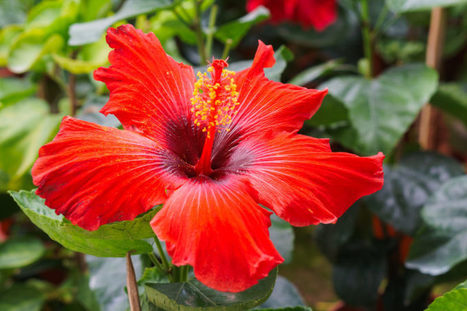Hibiscus flowers have been used for centuries. In traditional Chinese medicine, hibiscus leaves were used topically to help treat shingles and chickenpox. Now, this colorful flower is predominately used in healthy teas by millions of people all over the world.
Health Benefits of Hibiscus
Traditionally, Hibiscus has been used to relieve a cough, deal with liver disorders and reduce high blood pressure. It can be used alone or in combination with Indian gooseberry and coconut oil to promote hair growth and delay premature graying.
Aside from the mentioned benefits, hibiscus is also used for the following:
Lowers cholesterol Prevents the growth of cancerous cells Improves digestion Promotes blood circulation Aids cardiovascular health Helps treat urinary tract infections Promotes weight loss Helps treat kidney stones Prevents oxidative stress
Ayurveda recommends the use of extracts from the Hibiscus flower and leaves to treat menstruation disorders in women. These extracts also possess anti-fertility action and have been used for contraceptive purposes. Research even suggests that hibiscus possesses anti-cancer, anti-inflammatory, antibacterial and antidepressant properties.
How to Use Hibiscus Tea
Hibiscus can be made into a tea by steeping the flowers in hot water for a few minutes. To benefit from the hair growth promoting properties, soak a few hibiscus flowers overnight and the next morning, squeeze them, collect the extract and apply to the hair and scalp. Wash after a few hours with warm water.
Side Effects of Hibiscus
Hibiscus is generally safe for use, but because it tends to cause a lowering of blood pressure, it should not be consumed by individuals suffering from hypotension. This herb is likely to cause drowsiness and its use must be avoided when driving or performing activities that call for enhanced alertness.
Hibiscus must also not be taken by persons who are on anti-cancer drugs due to a possibility of harmful interactions. Due to its anti-fertility action, hibiscus is prohibited for pregnant women as it may lead to miscarriage. Make sure you talk to your doctor before using hibiscus to determine if adding it into your daily diet would be beneficial for you.
The content of this Website is for informational purposes only, is general in nature and is not intended to diagnose, treat, cure or prevent any disease, and does not constitute professional advice. The information on this Website should not be considered as complete and does not cover all diseases, ailments, physical conditions, or their treatment. You should consult with your physician before beginning any exercise, weight loss, or health care program and/or any of the beauty treatments.Via Liying XU



 Your new post is loading...
Your new post is loading...







